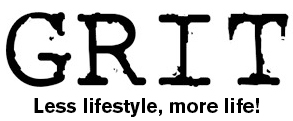

Editor
This month our contributors have shared their views on health-related and body image issues. We hope you enjoy reading their insightful articles which highlight the link between low self-esteem and eating disorders, the importance of expressing your individuality and how self and spiritual awareness can help boost your self-worth. Next month look out for a special edition of GRIT.
Thank you for your continued support.
Sunita Behl
Editor
After battling with an eating disorder for several years I am writing this article in the hope that someone in a similar position may benefit from my story. Like many people anorexia crept up on me. For the first few years I honestly didn’t realise that I had a problem or how serious my illness was. However as my condition escalated it would go on to have a devastating effect over my entire life.
To the outside world my life seemed perfect. I had always been slim. I was a high achiever and A* student. I was sporty and lived what I considered to be a healthy lifestyle. I gained a place to study at an elite university and it seemed my future was all set.
Looking back now I think my illness may have started just before my A levels. Many of my friends always seemed to be on various diets and I started to cut out food groups, particularly carbs. Over time I began to stop eating foods which I had previously enjoyed – basically anything which I considered to be ‘bad’. I became obsessive about calorie counting and began to exercise more often and more intensely. However, no matter how much weight I lost, it never seemed enough. I became withdrawn and I hated my body. At the time I thought that all of these negative feelings I had about myself were ‘normal’. I know now these feelings were actually caused by low self-esteem.
Whenever I would return home from university my parents would comment on my weight loss and how I wasn’t eating enough. I knew they were concerned but I would simply shrug it off and put it down to the stress of university. I reduced my visits home just so I could avoid having to talk about my weight with my family.
By some miracle I managed to get my degree and land myself a job in the city. However by this stage I was below my recommended Body Mass Index (BMI) – the height to weight ratio that doctor’s use. (You are medically diagnosed as anorexic if you are 15% or less of your ideal BMI). In addition to the weight loss I often felt dizzy or faint, my periods stopped and I had difficulty sleeping. Every thought I had was around food. I felt like I was in control but actually my anorexia was controlling me.
It wasn’t until a chance conversation with a work colleague that I realised something was seriously wrong and I needed help. My colleague joked about how half the girls in our office were so skinny because anorexia usually targets perfectionists and high achievers. The more she talked, the more I felt like she was describing me.
I was ashamed to think I may have a mental health problem but also desperate for help. I didn’t know where to go or who to speak to. I finally confided in a close friend which was the hardest thing I have ever done. She told me she had already suspected but didn’t know how to approach me or what to say. Just telling someone was a huge relief and I felt like a weight had been lifted off my shoulders. She came with me to see my GP and I decided to register as a private out-patient at an eating disorder clinic. I resigned from my job and spent the next year getting better and getting back my life.
It has been tough but with the help of an amazing therapist and supportive network of close friends I have now been in recovery for over four years and I am a healthy weight again. There is a huge stigma around eating disorders but they are so common. My advice to anyone who thinks they may have an eating disorder, or is concerned about someone they know, is that there is help and you can get better. The earlier you are treated the faster and higher your chance of recovery. I now look back and feel that I wasted what should have been the best years of my life. Please don’t suffer in silence alone for as long as I did. Talk to someone you trust and get help today.
Visit www.b-eat.co.uk for more information
Aahh..Body image! That great ongoing debate which we more often have in our own heads rather than out loud. No two eyes see the world the same way and there are a million different ways of looking at or interpreting a subject. So is body image just our own personal perception of how we see ourselves or how everyone else views us?
I’ll start with a few of my own ‘body image’ inner truths. I admit, pretty much every morning as soon as my eyes open, my hand almost on autopilot, touches my stomach and my brain subconsciously does a speed of light assessment on how bloated or fat it feels, which then determines my next thought of ‘yay, awesome’, or ‘hmm, that is not good!’ This is then followed by the assessment of thighs – I don’t stand there and analyse them, but I will purposefully glance in the mirror in some hope that they have turned into Elle McPherson legs overnight (to this day this is followed by, ‘no, not yet.’)
However at this point my awareness kicks in. Thankfully I have finally reached a stage in my life where I catch myself with these thoughts and 9 times out of 10 I now giggle rather than berate myself! Because it’s at this point, I have the power to choose and shift my thoughts and change that self-talk from what do I not like about myself into what I LOVE about myself…such as my charismatic personality and oh yes, my ears! Take a look at them when you meet me, they really are the best ears ever!
Over the past 9 years, self and spiritual development have played a massive part in shaping my life. It’s a bit like learning a new language. Over time you can learn a new way to look at yourself and thus the world. Once you become aware that everything you feel and see is your own perception you gain tremendous responsibility over your life because you can then choose how you look at things….and that includes how you feel about your body.
Do I think body image is linked to self-worth? Yes absolutely! Our self-worth is linked to every area of our lives from, love, health, body, career and even our finances. Do I think there is too much pressure on women to stay young or be thin? No! I refuse to blame external factors about how I feel. My feelings about myself are an internal job.
You may think your thoughts are automatic but they are not. They come from years of practicing a certain way of looking or interpreting things. So, if your thoughts are not serving you or not making you feel good, why not take on a new practice which in turn can generate new thoughts?
Body image is all about how the world perceives us. Therefore this whole subject stems from a fear of how the world will judge us. Well, here is some food for thought: if we’re concerned with the way the world will perceive us, surely we are perceiving the world as a place that judges, and who has the power to change that?
We do!
As the great late Wayne Dyer said
“If you change the way you look at things, the things you look at change.”
Full disclosure – I feel pressured to stay young looking and thin. Not all women do, I do.
I went out for dinner with a friend the other day and she wanted dessert. I didn’t. I have to really fancy something sweet to order dessert, otherwise it’s just not worth it for me and I won’t enjoy it. She couldn’t understand why I wouldn’t eat one. She couldn’t understand that I’d be happier not eating one. The standard comment ‘you’re so good’. I’m not being good. It’s what Kate Moss said ‘nothing tastes as good as skinny feels’. Well some things taste better than skinny but, for me, that’s not dessert.
My friend said she wished she could be slim like me but she loves food too much. However I also love to eat. I went on to explain to her that she was lucky that her happiness wasn’t linked to her weight. She can be whatever size she is and gorgeous and happy. With me however, as soon as I put on a little weight, my clothes are tight. I can’t find anything to wear. Life becomes that bit harder. If I’m honest, my body size can affect my self-esteem. (By the way I gave into peer pressure and ordered dessert to make her happy.)
I have exercised and watched what I eat for the past 20 years. I took a break recently. I thought I’d finally just eat, whenever, whatever I was given, whether I was hungry or not. I put on weight, I wasn’t happy. I had to find loose clothes. I didn’t like how I looked in pictures. For me it’s easier to live a controlled life and stay happy and confident throughout my day. Exercise also helps to relieve stress, keep me looking young and makes it easier to complete daily chores. Photo-shopped female images don’t make me sad. They inspire me to eat well and train harder. And in this Western world of obesity, what’s the harm in that?
I appreciate mine is a controversial opinion and perhaps not what you want to hear. I did start with ‘full disclosure’. I feel pressured to look young and stay slim and I’m good with that.
Anyone who knows me will know I love to dress up. It is my way of loving and expressing myself. However during my teenage years I never thought I was beautiful. So what changed?
My turning point in how I saw myself was during my education in visual arts. In design school there were no rules to dress ‘appropriately’. And so I began my journey with my individuality which has evolved over time. I don’t think my extended family ever understood my ‘misfit’ dress sense but thankfully my parents let me be me. And I am still a misfit today.
Feminists, most famously Naomi Wolf, makes a good case in The Beauty Myth. The more power women have, she says, the more pressure there is on them to be beautiful. And passive. Women,” she wrote, “are mere ‘beauties’ in men’s culture so that culture can be kept male… A beautiful heroine is a contradiction in terms, since heroism is about individuality, interesting and ever changing, while ‘beauty’ is generic, boring and inert.” In the struggle for women’s equality, there is one subject still shrouded in silence – women’s compulsive pursuit of beauty. The myth of female beauty challenges every woman, every day of her life.
Naomi Wolf exposes the tyranny of the beauty myth through the ages and its oppressive function today, in the home and at work, in literature and the media, in relationships between men and women, between women and women. With pertinent and intelligent examples, she confronts the beauty industry and its advertising and uncovers the reasons why women are consumed by this destructive obsession.
Concern with appearance is not just an aberration of modern Western culture. Every period of history has had its own standards of what is and is not beautiful, and every contemporary society has its own distinctive concept of the ideal physical attributes. In the 19th Century being beautiful meant wearing a corset – causing breathing and digestive problems. Now we try to diet and exercise ourselves into the fashionable shape – often with even more serious consequences.
The Fashion and Beauty sector have been the harbingers of beauty and perfection. I am an advocate of style and individuality over fashion. Conscious fashion brands are introducing a ‘non-negotiable’ clause requiring models to eat, while being watched, and using real life models. In our own campaign for House of Gharats I collaborated with and featured a 60 year old ballerina to tell our Fashion is Human story.
Self-confidence and love for yourself is something you have to find within yourself. Create safe zones for yourself according to your own needs. Go after things with all your heart. Be totally invested in the present moment and recognize the energy that different aspects of your life bring to you. Have different sources of joy and cultivate them with intensity, whether it’s your job, a love interest or a passion you have.
I wake up every day, get myself ready, head off to work and at some point during the day, like most women, I’ll check my reflection and preen and perfect – that’s just the way women are. We self-scrutinise and try to improve when in actual fact we’re probably all beautiful just the way we are and should stop striving to achieve impossible perfection. Would we really love ourselves more if that mole wasn’t there or the knees weren’t as knobbly? We’d probably be content for about 30 seconds before some out-of-place hair whittled down our self-esteem once more.
Something that brought me back down to earth and made me realise just how lucky I was, was my visit to India. I work for the international charity Lepra and recently travelled to the state of Bihar to witness our work tackling neglected diseases first hand there.
Leprosy is a bacterial disease that, if diagnosed early enough, can easily be cured and leave no lasting mark. However, if the disease goes untreated for many years, a person affected can end up living with a permanent disability. That’s the case for the estimated four million people affected who now face a life either with no fingers or toes, clawed hands, a dropped foot or even a loss of vision.
Meeting people with such severe physical effects of leprosy put the average female’s grumbles about her appearance into perspective.
Of course body image affects self-esteem and having such visible signs of leprosy leads many people, women in particular to hide away. They are subject to the judgement of their community as leprosy itself has such a negative connotation around it, but they also self-stigmatise. They cover up and harbour shame for the economic burden and societal embarrassment they place on their families – often females with leprosy are unable to marry or are abandoned by their husbands. Such a stigma should not exist given that it is an entirely curable disease.
I am so proud to be working with a charity that works to ebb away those feelings of shame and low self-esteem and looks to restore the lives of those affected by leprosy.
Obviously prevention is a big part of that so we deliver health education campaigns informing people of the need to seek help at an early stage, when the first signs of leprosy present themselves. But we also work with those already affected. We look at whether reconstructive surgery is a possibility, if physiotherapy would help. We also offer counselling and encourage people affected to become members of our self-help groups. Bringing together people affected by neglected diseases allows them to share experiences, learn new skills together and build their confidence as they begin to learn ways that will help them sustain themselves and no longer be ashamed of their disabilities.
Through this experience alone I saw the clear link between body image and self-esteem and the devastating effect the physical consequences of leprosy can have on a person’s feelings of self-worth. However, by providing access to education and support, self-esteem can be rebuilt and with this renewed confidence people can overcome the challenges they face to fulfil their potential.
For more information about Lepra, visit: www.lepra.org.uk
Do you want to write for GRIT?
Each article needs to be submitted to grit@womenempowered.co.uk on the 20th of the preceding month (eg an article for June should be submitted by 20th May). The newsletter will go out on the 5th of each month to our subscribers and will be uploaded on our website and our social media will direct to it.
All submissions should be between 400-700 words. They can be written in the first person where appropriate. They will be edited for content to ensure suitability. Please ensure they are verified with source if it contains factual content. If the topic is personal then please ensure that you have been mindful of others where appropriate and ensure your account is as accurate as possible. Articles submitted will be chosen at the discretion of the editor. Please also be sure to include a photo and your name as you would like to be credited (title / position etc if applicable)
2016 GRIT Topics
OCTOBER – Special Issue.
NOVEMBER – Is a woman’s role changing?
Do you think a woman’s role has changed? How different is your life to previous generations? Do you think you have more opportunities than ever before or that there is more pressure to succeed? Is it really possible for a woman to manage ambitions alongside a happy family life? How has a woman role changed in society and the wider world? Please share your views..
DECEMBER – Looking forward to 2017
What are your big hopes and plans for 2017? What will you change or how will you make a difference? Please share your proud moments, memories and achievements of the past year and your hopes for the New Year.
WE needs YOU!
Thank you.
Disclaimer: Women Empowered is a wholly social initiative run by volunteers which aims to empower women to make the best of their individual skills and talents and help them to achieve whatever personal and professional goals they may have. We work at a grass roots level, trying to ensure we are easily accessible to all who would like to reach us.
GRIT is a place for the Women Empowered community to share their life experiences. Articles in GRIT represent the views of their authors and do not represent the views of Women Empowered.
To the extent permissible by law, Women Empowered assumes no responsibility for information published in GRIT and disclaims all liability in respect of such information.
Women Empowered is not liable for any injury and/or damage to persons or property as a result of any actual or alleged libellous statements, infringements of intellectual property or privacy rights, whether resulting from negligence or otherwise.
Women Empowered does not warrant that the information published in GRIT is accurate or free from error. Information published in GRIT is intended solely for the purpose of providing general information and/or opinion.
You agree to accept the application of English law to govern matters between Women Empowered and yourself





